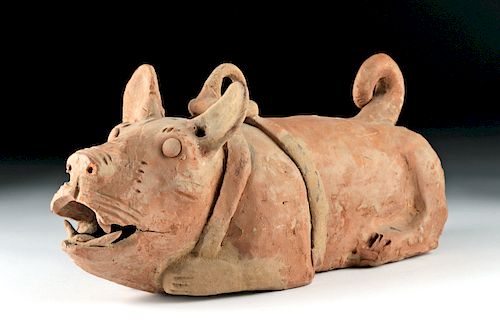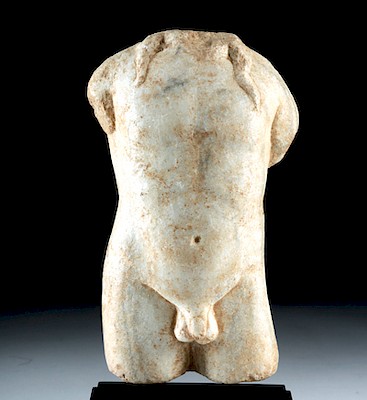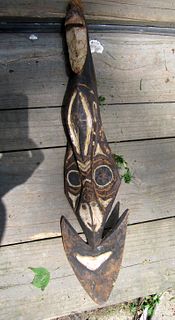Chinese Han Dynasty Terracotta Dog w/ TL
Lot 95
About Seller
Artemis Fine Arts
686 S Taylor Ave, Ste 106
Louisville, CO 80027
United States
Selling antiquities, ancient and ethnographic art online since 1993, Artemis Gallery specializes in Classical Antiquities (Egyptian, Greek, Roman, Near Eastern), Asian, Pre-Columbian, African / Tribal / Oceanographic art. Our extensive inventory includes pottery, stone, metal, wood, glass and textil...Read more
Categories
Estimate:
$2,000 - $3,000
Absentee vs Live bid
Two ways to bid:
- Leave a max absentee bid and the platform will bid on your behalf up to your maximum bid during the live auction.
- Bid live during the auction and your bids will be submitted real-time to the auctioneer.
Bid Increments
| Price | Bid Increment |
|---|---|
| $0 | $25 |
| $300 | $50 |
| $1,000 | $100 |
| $2,000 | $250 |
| $5,000 | $500 |
| $10,000 | $1,000 |
| $20,000 | $2,500 |
| $50,000 | $5,000 |
| $100,000 | $10,000 |
| $200,000 | $20,000 |
About Auction
By Artemis Fine Arts
Dec 5, 2018
Set Reminder
2018-12-05 10:00:00
2018-12-05 10:00:00
America/New_York
Bidsquare
Bidsquare : DAY 1 | Classical Antiquities & Asian Art
https://www.bidsquare.com/auctions/artemis-gallery/day-1-classical-antiquities-asian-art-3698
Day 1 of an important 2-day auction featuring ancient and ethnographic art from around the world. Egyptian, Greek, Roman, Viking, Near Eastern plus Asian Art from China, Japan, Thailand, Vietnam, Burma, India, more. Artemis Fine Arts info@artemisgallery.com
Day 1 of an important 2-day auction featuring ancient and ethnographic art from around the world. Egyptian, Greek, Roman, Viking, Near Eastern plus Asian Art from China, Japan, Thailand, Vietnam, Burma, India, more. Artemis Fine Arts info@artemisgallery.com
- Lot Description
East Asia, China, Han Dynasty, ca. 206 BCE to 220 CE. A charming ceramic dog, lying in a prone position with his legs tucked beneath him, a perky tail curled above his haunches, and a very alert expression, featuring large raised ears, a pronounced snout with incised whiskers, wrinkles on his nose, flaring nostrils, bulging wide-open eyes with incised lashes, and an open mouth revealing his tongue and sharp teeth. One can almost hear him barking! An applied collar and harness is placed around his neck and shoulders. This canine is the picture of watchfulness and companionship, a faithful dog ready to guard his master's tomb! Size: 11.25" L x 5.125" H (28.6 cm x 13 cm)
Han Dynasty sculptors recreated various breeds of dogs in their artwork, and this example is most likely a chow dog, who are often shown with harnesses because they were used to pull small sleighs. Tomb figures like this one are part of a class of artifacts called mingqi - sometimes known as "spirit utensils" or "vessels for ghosts". They became popular in the Han Dynasty and would persist for several centuries. Alongside figures like this one were other animals, musicians, athletes, structures… anything the deceased might need to recreate the world of the living. Mingqi of the Han Dynasty often show a high level of detail and naturalism as we see in this example. These were designed to assist the po, the part of the soul of the deceased that remained underground with the body while the hun, the other part of the soul, ascended. Caring for the po seems to have taken on a new level of meaning in the Han period, with more elaborate rituals and tomb construction arising.
Provenance: private Rochester, Michigan, USA collection
All items legal to buy/sell under U.S. Statute covering cultural patrimony Code 2600, CHAPTER 14, and are guaranteed to be as described or your money back.
A Certificate of Authenticity will accompany all winning bids.
We ship worldwide and handle all shipping in-house for your convenience.
#138136Front paws restored. Probable restoration to tail, ears, and sections of collar. Expected surface wear, scuffs, nicks, and abraded areas. Body possibly repaired from several large pieces.Condition
- Shipping Info
-
All shipping is handled in-house for your convenience. Your invoice from Artemis Gallery will include shipping calculation instructions. If in doubt, please inquire BEFORE bidding for estimated shipping costs for individual items.
-
- Buyer's Premium



 EUR
EUR CAD
CAD AUD
AUD GBP
GBP MXN
MXN HKD
HKD CNY
CNY MYR
MYR SEK
SEK SGD
SGD CHF
CHF THB
THB
















